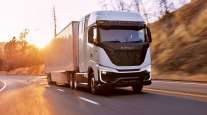Senior Reporter
Nikola’s Badger Pickup Truck Touts 600-Mile Range

[Stay on top of transportation news: Get TTNews in your inbox.]
Nikola Corp. announced a plan to build an electric pickup truck called the Nikola Badger with a maximum range of 600 miles at a yet-unnamed truck maker’s manufacturing facilities and with the other truck maker’s certified parts.
Since the Feb. 10 unveiling of the Nikola Badger, interest continues to climb and overall feedback has been overwhelmingly positive, a spokesperson told Transport Topics. Limited reservations will be accepted this year, and discussions continue with original equipment manufacturers.
Announcements will follow when appropriate, the spokesperson said.
We've gone full #Badger mode. The most fierce animal alive perfectly portrays the most fierce truck ever built. Introducing the #NikolaBadger The world’s FIRST hydrogen and battery-powered pickup truck. @Heavydsparks1 pic.twitter.com/zvQ0YthdU4 — Nikola Motor Company (@nikolamotor) February 10, 2020
The truck is scheduled to come in 120 kW hydrogen fuel cell or 160 kWh battery-electric versions. The battery-electric vehicle (BEV) has an expected range of 300 miles.
Offering customers the option to order a fuel-cell or battery-electric version will ensure Nikola drives the cost down across its lineup, said Mark Russell, president of Phoenix-based Nikola Corp.
“I have been working on this pickup program for years and believe the market is now ready for something that can handle a full day’s worth of work without running out of energy,” Nikola CEO Trevor Milton said in a release. “This electric truck can be used for work, weekend getaways, towing, off-roading or to hit the ski slopes without performance loss. No other electric pickup can operate in these temperatures and conditions.”
Heavy D, a reality TV star from “Diesel Brothers,” has partnered with Nikola to follow the Badger build from concept through production.
The Badger is being engineered to deliver 980 foot-pounds of torque, 906 peak horsepower and 455 continuous horsepower.
With a fully loaded trailer and combined vehicle weight of 18,000 pounds, the Badger will be able to launch from a standstill on a 30% grade without motor stall, the company reported. The specs may vary according to fuel-cell electric vehicle (FCEV) or BEV-only mode, temperature, elevation, tires, wheels, software packages, production requirements, hardware and regulations.
In part two of a two-part exploration of autonomous technology today, our latest RoadSigns podcast revisits conversations with Chuck Price of TuSimple and Ognen Stojanovski of Pronto.ai. Hear them discuss a palatable Level 2 version of trucking autonomy. Listen to a snippet above, and to hear the full episode, go to RoadSigns.TTNews.com.
Nikola’s electric pickup joins similar electric pickup offerings from Tesla, Ford Motor Co. and General Motors. Workhorse offers one with an 80-mile range.
Nikola’s prototype will be on display at a company event scheduled this fall in Phoenix.
The pickup prototype joins Nikola’s emerging lineup of three heavy-duty trucks intended to use the same alternative power sources. The introduction of electric-powered commercial trucks gained momentum in 2019 with more investment, more prototypes unveiled and more deployments in real-world freight operations.
The world’s largest truck makers and their suppliers have made it clear that they see electrification as a force in the industry’s future.
The push is attributed in part to cutting emissions, and that means working toward sharply reducing use of diesel, which is still trucking’s main fuel.
Further, states and other locales such as seaports are heralding zero-emissions vehicles.
For example, California, the country’s most populous state, could become the first to require a portion of new truck sales be electric or “zero-emission” vehicles as it grapples with how to clean up its worst-in-the nation air quality.
Home to the two largest ports in the country in Los Angeles and Long Beach, California reportedly has roughly 1.5 million medium- and heavy-duty trucks on the road that spew harmful pollutants as they haul freight to warehouses. The state’s transportation sector accounts for 41% of all greenhouse gas emissions, a cause of climate change, and is a major source of ozone and particulate matter pollution that can cause respiratory problems.
California already has a rule requiring carmakers to offer for sale specific numbers of clean cars.
Want more news? Listen to today's daily briefing:





